News from the Institute
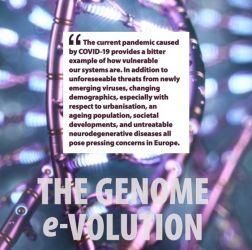
The European Investment Bank (EIB) regularly invites international thought leaders to write about the most important issues of the day, an essay series dubbed “Big Ideas”. On the occasion of Croatia’s presidency of the EU Council, Croatian-born IBC2 Director Ivan Đikić was asked to contribute his view on the role of modern science in advancing healthcare. In his essay, he analyses the biomedical challenges ahead of us, especially with respect to common diseases like cancer and neurodegeneration, but also those emerging from novel viruses, rare diseases, and – last not least – from environmental and societal changes. He writes about the endurance needed for translational science to succeed, how progress has often lagged behind expectations and why technologies are the key to success. Finally, he shares his thoughts about a needed culture change with respect to drug discovery to ensure fair access of scientific progress around the globe and throughout societies.
... (read more)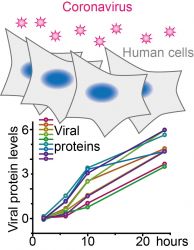
Since the beginning of 2020, a new coronavirus (SARS-CoV-2) has been spreading, leading to a pandemic with > 126,000 infections around the globe recorded until today. In people, the virus causes a disease named COVID-19, which can cause severe respiratory failure and has already led to more than 4,600 deaths. The mechanisms by which SARS-CoV-2 enters cells, how the cell responds to infection, and which therapeutic approaches could stop viral replication remain unclear. Now, IBC2 group leader Christian Münch, together with Jindrich Cinatl (Institute of Medical Virology, University Hospital Frankfurt), provides some answers to these questions. Using SARS-CoV-2 isolated from COVID-19 patients in Frankfurt, they established a cellular model to study coronavirus infection. Using a recently developed novel translation proteomics method, they analysed how viral infection changes cellular protein synthesis and abundance. This revealed several cellular pathways strongly modulated upon SARS-CoV-2 infection. Strikingly, using drugs targeting these pathways – some of which are approved for use in other diseases – prevented SARS-CoV-2 replication in cells. This reveals potential new therapeutic strategies for specific COVID-19 treatments.
... (read more)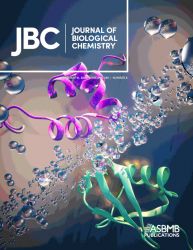
DUBs are vital for the regulation of ubiquitin signals, and both their catalytic activity and their target selection needs to be tightly controlled. As reported in today’s issue of the Journal of Biological Chemistry, the group of Anja Bremm identified asparagine hydroxylation as a novel post-translational modification involved in the regulation of the DUB Cezanne. Cezanne controls essential cellular functions and signaling pathways. The team demonstrated for the first time that the predicted ubiquitin-binding domain (UBD) in Cezanne is functionally active and interacts with ubiquitin in a unique manner. At the same time, they discovered a novel regulatory mechanism: Hydroxylation within this domain inhibits ubiquitin binding and therefore may affect Cezanne’s ability to bind specific target proteins via its UBD. Hydroxylation is carried out by FIH1 (factor inhibiting HIF1), which is a key regulator of the cellular oxygen sensing machinery, and the reaction is dependent on oxygen levels.
... (read more)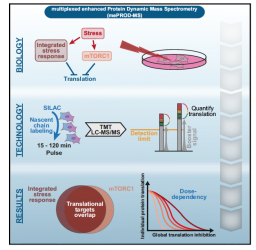
As published in today’s online issue of Molecular Cell, the Münch Group added signal amplification to dynamic SILAC-driven multiplexing proteomics, resulting in a quantum leap with respect to detection of small signal changes. They dubbed their new method as “mePROD” proteomics – for multiplexed enhanced proteins dynamics – and showed that it enables precise and in-depth quantification of nascent protein chains shortly after labeling. Technically, the signal amplification was achieved by adding a booster channel that increases the signal of interest in a sample. mePROD provides with unprecedented insight into minute translational changes occurring e.g. after stress signals. It is a highly sensitive approach which comes at a low cost and adds a completely new layer of information, therefore complementing established methods for translatome analysis like Ribo-Seq. In addition, it is applicable in situations where sample size is limiting, as it needs only about 100,000 cells.
... (read more)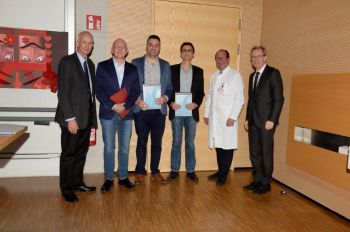
In recognition of the comprehensive redesign and modernization of the biology lecture and courses for medical students, Frank Bonzelius today received the Frankfurt Medical School’s most prestigious Teaching Award. The award is endowed with 25,000 €. Over the past years, Frank took the lead in tailoring all teaching material to the digital era. Everything was optimized for smartboard presentation, iPads were introduced for live-analysis of microscopic images and along the lines of a blended-learning scenario, several interactive eBooks were created. It is not the first recognition Frank receives for his outstanding engagement in teaching. He has repetitively been suggested by students for various awards, and has been honored with an award for “Outstanding dedication to teaching” in 2011 by the Frankfurt Medical School.
... (read more)